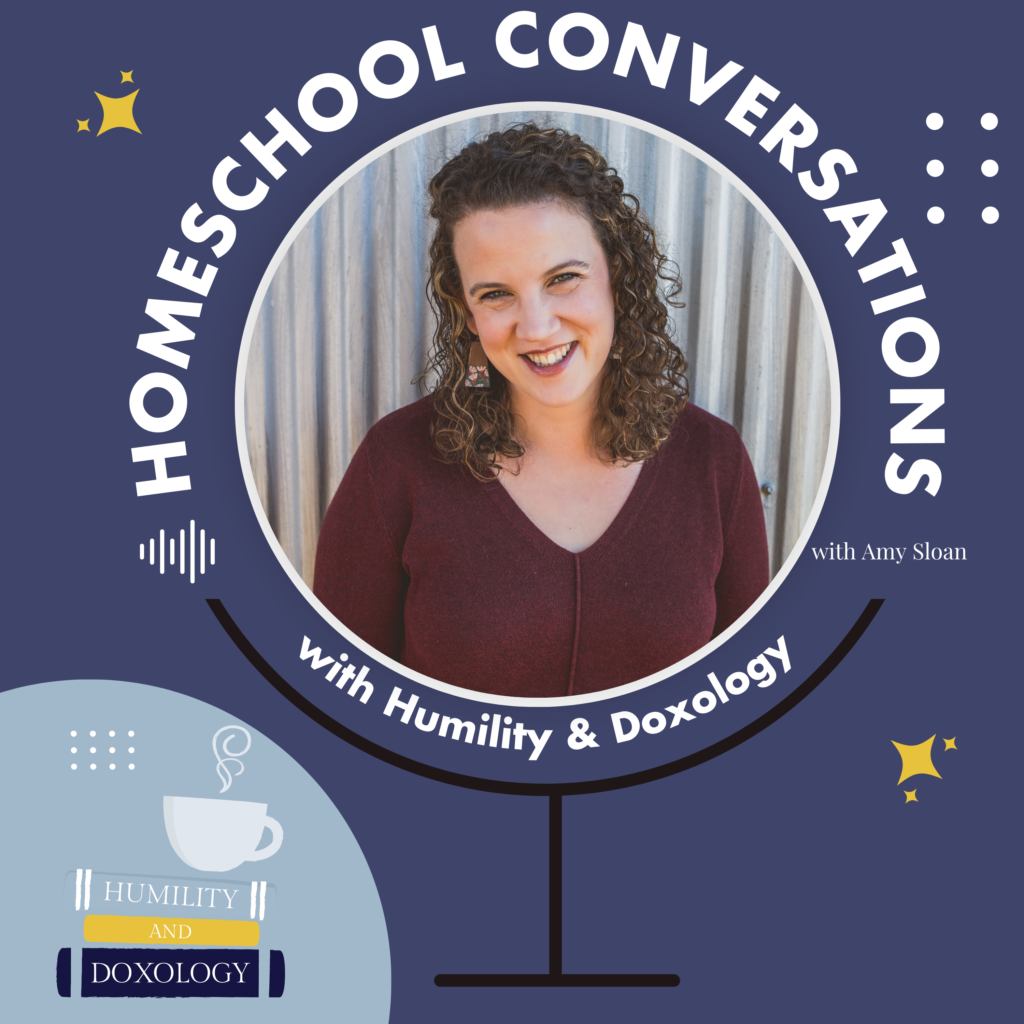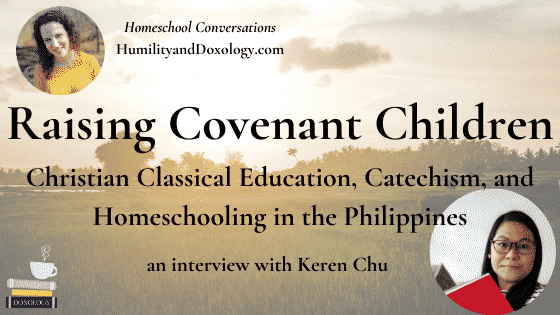The purpose of education is not to fill our children’s heads with knowledge. Rather, we want them to grow in wisdom, in wonder, and in love of God and neighbor. And our most important job as Christian parents is to raise our children to be fellow worshippers. These are just a few of the topics Keren Chu and I discussed in this week’s Homeschool Conversation! Keren is a pastor’s wife and homeschool mama classically educating her young children in the Philippines. I have followed Keren online for a while, and I’m always encouraged by her. You are going to love this chat, so queue it up in your earbuds or read the full transcript below!
Be sure to check out all the other interviews in our Homeschool Conversations series!
Watch the video. Listen to the podcast. Read the show notes. Share with your friends!

{This post contains paid links. Please see disclaimer.}
Who is Keren Chu?
Keren Chu is a pastor’s wife and a homeschooling mama of two from Manila, Philippines. She loves learning and sharing about classical education, covenantal parenting and theology. Keren tries to chronicle her homeschooling journey, reflections and projects over at Raising Covenant Children.

Watch my conversation with Keren Chu
Prefer to listen to your content? Subscribe to Homeschool Conversations on Apple podcasts or wherever you get your podcasts so you don’t miss a single episode!
Amy Sloan: Hello friends. Today, I am joined by Keren Chu. Keren is a pastor’s wife and homeschooling mama of two from Manila, Philippines. She loves learning and sharing about classical education, covenantal parenting, and theology. Keren tries to chronicle her homeschooling journey, reflections, and projects over at Raising Covenant Children. I have enjoyed many of your articles over the past year or so and I’m so excited to get to talk to you today.
Keren Chu: Thank you for having me. It’s a real honor to be here.
Homeschooling Life in the Philippines
Amy: Keren, could you just start first by telling us a little bit about yourself and your family and why you decided to homeschool?
Keren: I’m a pastor’s wife and homeschooling mama of two. My daughter is eight years old. She recently turned eight, and my son is four years old. My husband and I planted a church in Quezon City in Manila, Philippines called Pilgrim Community Church in 2011, which eventually launched in 2013. We’ve been doing church ministry. He’s doing ministry as a pastor for about seven years now. That’s our life. We’re a pastor’s home.
For me, personally, I love books. I love collecting books. Sometimes I buy more books than I can read them. I love plants. Raising coniferous plants. It’s pretty interesting learning about that.
I love coffee. That is one of my passions. I’ve actually tried selling a few coffee gears before starting homeschooling. That was one of my side businesses. Help out with the family. Before getting married, my husband, who was my then-fiancee had already discussed about homeschooling, but I was quite apprehensive at first because I was mainly ignorant about homeschooling. About 10 years ago the homeschooling climate in the Philippines wasn’t as friendly as it is now, especially during the pandemic. Everyone’s sort of homeschooling.
About more than 10 years ago, there were only a handful of people that I knew were homeschooling in the Philippines. It’s relatively new here. It’s not something like you guys in the US, a lot of homeschooling families. There were a lot of misconceptions at the very start and the usual caricatures. How are we supposed to socialize them? Can they keep up with their peers? That’s how I started. Then of course, when we got married, we started talking about it, but we didn’t really get into it. Just read about it and discuss until our second child came.
My husband and I decided to enroll our eldest daughter in a preschool because this is the usual practice. This is what Filipinos do. We enroll our kids to school and that’s the usual practice. We tried to do that. We tried to follow that route. My daughter at that time, she was around four or five years old. She was coming home tired and worn the whole day, even in preschool. It was also around that time that we learned that she had some learning challenges. She has dyslexia and she was starting therapy around that time. She was coming home tired and worn and the usual excited child that we once knew was no longer there.
I felt very sad to see that, to see her lose that passion in learning. When she was around kindergarten– There’s nursery, pre-kinder, and kindergarten. During her third year of school, we decided to take matters into our own hands and decided to homeschool her. Pulled her out of school right in the middle of the academic year. We said, “Okay, we’re going to homeschool her,” because I think this is the best way for her to learn.
I’d like to think that our reasons for homeschooling were pragmatic at first because just to have an easy solution to get ourselves out of that situation but it quickly became purposeful because this is what we’ve been reading about, studying about, and talking about throughout this whole time. It was an easy move because we’ve already talked about it. It felt great to see that slowly she’s gaining back that enthusiasm in learning. That’s how it started.
Amy: I liked to hear that story too because this year, in particular, there may be many families who started homeschooling for more of those pragmatic reasons. It’ll just be easier, less stress and they’re learning that they love it and they’re seeing all these other areas of value that now they’re like, “I don’t think we’re going to give this up. This is amazing.”
Keren: Yes. It’s the same way when I started with my trying to be proactive in teaching my son just to converse with him at home. That’s how I started posting online so that I could keep accountable in sharing our learning with other people and that’s how I found that it’s helpful for other people too. That’s how I learned to love homeschooling. That’s when I realized I can do this. That’s how we started.
Amy: You mentioned that homeschooling is a little different in the Philippines, and especially 10 years ago it was not very common. It’s a little bit more common now. For those of us who live other places around the world, could you tell us a little bit about what homeschooling just looks like in general in Philippines?
Keren: There are two ways of homeschooling in the Philippines. One would be you would be registered and the other would be independent. Being registered or being enrolled means you are registered with a homeschool provider. A homeschool provider basically processes all the papers and registration for you with the Department of Education which is pretty big here. Each student when they get to college or university, they’re required to have a learner’s number. Everyone needs to have that.
Being enrolled with a homeschool provider is just an easier way to get all those papers done, and that means you have to submit portfolios regularly, it depends on the requirement of the provider. It also means you have to follow a subject-based curriculum provided by the Department of Education.
The other side of that would be independent, which means you are not signed up with any homeschool provider. You can decide to do whatever you want at home. If you do decide to be part of the system, there is that educational placement test that most families who are independent decide to take annually.
That way, you don’t have to take it regularly because it’s required for every grade. First grade, second grade. Some independent homeschooling families in the Philippines decide to take that every year, just so they would see how they would fare in the present system. Two ways.
Amy: Do you have a community of people around you that also homeschool?
Keren: Yes. Maybe about two years or so now, some of the families in our church community also started homeschooling. That’s my community. The people in our church. Shared values, shared beliefs, shared theology, and everything. It’s great.

Keren’s Favorite Parts of Homeschooling in the Little Years
Amy: That’s wonderful. What have been some of your favorite parts of homeschooling in these little years? Because your two children are still very young and that’s a very special time of homeschooling.
Keren: My favorite part I guess would be being the first witness to wonder, and that’s very important for me. That was one of the primary reasons why we pulled our daughter out of school because she was starting to lose that sparkle so to speak or that awe or wonder in learning so that she could just keep up with the standards and what was required of her at such a young age. I loved that in the little years that you could engage that curiosity and having them ask weird questions about everything.
I enjoy seeing God’s world in new ways through their eyes. Because I’m older and I forget that in seeing the world again through their eyes is very precious in the little years. You have a lot of that. You have like, “Oh, yes, I forgot about that and it’s wonderful.”
The second thing I guess would be wisdom. I love that I am able to impart the knowledge of God through His word. I treasure those times.
Just like Timothy, where his mother and grandmother taught him. That passage in 2 Timothy. I love that. How from childhood from infancy you have been acquainted with the Holy Scripture unto salvation. I love that I get to be a part of that to see them enjoy, know about God’s word, to love the Lord Jesus, and love his people through praying for them. I see that grow throughout the years as little as they are. In months and weeks even to see that little growth, it’s wonderful. I’m glad to be also one of the first persons to answer their weird and hard questions about God. I enjoy that.
Amy: Then you get to have this front seat of just being right there seeing God at work in their hearts. It’s such a precious gift. I love that stage. (The older stage is also delightful for different sets of reasons. Just in case my teens are listening.)
Keren: I’m looking forward to that. [laughs]
Challenges of Homeschooling
Amy: Those little years are really fun. Well, what have been some of the challenges of homeschooling thus far, and how have you sought to overcome those?
Keren: Math. Math has been difficult for us. I asked my daughter earlier what’s the hardest thing in homeschooling? She just flat out told me, “It’s math. It’s really hard, Mama.” How have we tried to deal with that? Slow and steady wins the race. That’s what we try to do. Every day trying to master the concept.
We try to master the concepts just slow and steady along the way. It’s like that. Life is like that. Homeschooling is like that. You don’t memorize or master things in an instant. Sometimes it takes a while to get there. I try to remind myself that and I try to remind my children that life is like that.
The other part is to do classical education in the Philippines because not a lot of people are homeschooling and the numbers dwindle down even more if you talk about classical education. That’s the difficult part. I try to learn all I can from you guys, from the podcast, from blogs, and any way that I can to help myself be equipped in this area.
The influence of Classical Education on Keren’s homeschool
Amy: Well, that’s a perfect segue to the next question I had for you, which is just what initially drew you to the classical homeschool philosophy especially since you just mentioned it’s not very usual where you are? How is that influencing the way you’re educating your young children?
Keren: I first learned about classical education from a homeschooling mom of four. She’s one of the two that I know. When I visited her house about 10 years ago, she gave me books by Susan Wise Bauer, Doug Wilson, and everything and that got me started. She asked me, “You really want to homeschool? Here’s some books.” She gave me a stack of books to read and that’s how I got started. Started reading and learning about homeschooling and classical education. Then, while reading this stuff, I found Dorothy Sayers’s essay, The Lost Tools of Learning. It resounded so much of how I wanted to educate my future children. I didn’t have kids back then.
It resounded so much with me what she said, “Whatever instruction fails to do this is effort is spent in vain.” That’s what she said. When I read that I was, “Yes, this is what I want.” I think Sayers’ essay set me down into the rabbit hole and I have been learning and learning so much along the way.

The 5 Rs of Keren Chu’s classical homeschool
How do we homeschool classically or how has it influenced us? I can think of the five Rs that I tried to do. Here’s how I try to understand it because it’s not being done so much. Here is my way of how I do it in the little years: Five Rs.
The three Rs is what we usually know about. The reading, writing, and arithmetic. Since reading Ravi Jain’s and Kevin Clark’s The Liberal Arts Tradition, the revised edition, I incorporate two other Rs to make it five Rs. There’s reading, writing, arithmetic, and I’ve also included religion and rhythm.
Religion for me, of course, is passing on the Christian faith and to include the classical concepts of paideia and pietas (Paideia and piety). Paideia, as inculturation indoctrination passing on the tradition, and piety, inculcating that love of God, love of neighbor and love of country, love of city. It’s all included in that.
The other one would be rhythm, gymnasium and music, which is so much part of ancient world. That’s how I try to understand. That’s how I now understand that. It probably changed as I learned some more, but this is how I tried to summarize it especially in the little years.
The five Rs. Reading, writing, arithmetic, religion, and rhythm. Because movement is so important for me, I think it’s helpful in learning especially for my kids during the middle years. Having that rhythm, that idea of movement. They don’t have to sit still all the time. That’s part of gymnasium and music, which includes poetry, music, and history and all of that. That’s how I try to summarize it in how I understand it now.
Amy: Yes. I love that. It’s so encouraging to hear your perspective. I really appreciated The Liberal Arts Tradition the newly revised edition that came out and that emphasis on that wisdom that starts from the fear of the Lord. The end of wisdom really being love the Lord your God with all your heart, soul, mind, and strength, and love your neighbor as yourself. That really sums up what we’re doing with education. That is a whole different way of thinking. If we keep that in the forefront of our mind, that has such implications for our priorities and our homeschool.
A few of Keren’s favorite books and resources for Christian Classical Education
Well, you said that someone gave you this stack of books. It was like, “You want to homeschool? Here. Read these.” If you were talking to someone who is curious about Christian classical education, what are some of your favorite books or resources that you would pass on to them?
Keren: My favorite Primer, I think, was the author Christopher Perrin’s Introduction to Classical Education because it’s so short and it’s free online that you can read through their website Classical Academic Press. Like I’ve mentioned that The Liberal Arts Tradition revised edition, but it’s not really an intro book. It’s quite a difficult read. I read through it slowly and whenever I reread it I still get a lot of things. I would start with that, the Introduction to Classical Education by Dr. Christopher Perrin.
At the same time, I tried to enroll at classicalu.com and that has been helpful for me to take some classes. And of course, podcasts! The free and easy way: Schole Sisters, Schole Academy, and your podcast. That’s one of the easiest ways to get into knowing how people are doing it, and that’s the best way to go, I think.

Catechism, faith, and theology in homeschool and family life
Amy: I’ll include those links to the things you mentioned in the show notes for this episode so people can check those things out. Well, let’s switch gears a little bit. Of course, we know that our theology and our education are all intertwined together so they’re not really two distinct categories. For the sake of the conversation, let’s switch gears and talk a little bit about the role of faith and theology in our homeschool or in our family life. I would like to know what role catechesis plays in your family and maybe you could explain that for someone who’s new to that concept.
Keren: Catechesis or catechism as its usually known comes from the Greek word katecheo or “to sound down upon” or “to instruct”. It’s an age-old practice, not just by Christians actually by all sorts of people, many, many years ago. It’s a teaching tool, you could say a teaching practice, that uses question and answers to help the one being instructed (the catechumen) to learn what they need to know.
We do that all the time when we give instructions to kids. “What does mom need you to do before you go to bed?” That is sort of catechism. “I need to brush my teeth. I need to take a bath.”
That’s a sort of catechism that we do all the time but for some reason, it’s been lost in terms of passing on the faith. We think of it as a rigid way. “Why do I need to do that?” It sounds so difficult, but if you realize how kids are so great at memorizing things, catechesis is actually very helpful to help them know about the grammar of the Christian faith, especially in the earlier years. It plays a very important role in our family because I see it as a way of fulfilling our vows as parents, during their baptism.
We promise when as Presbyterians we baptize our children because we believe that they are part of God’s covenant family, and it’s part of our fulfillment of our vows that we made as parents during their baptism that catechism along with family worship fulfills those vows of instructing our children with the principles of the Christian faith as summarized in our confession. Catechism along with family worship helps us fulfill those vows, and at the same time, I see catechesis as an application of paideia, I mentioned that earlier.
I think it’s very important. Paideia actually it’s found in Ephesians 6:4, where Paul instructs the Ephesian church fathers, “Do not provoke your children to anger but bring them up in the discipline and instruction of the Lord.” That word there “discipline” in the Greek is actually the word “paideia” which has this idea of discipline, teaching, or passing on the culture, and paideia promotes that idea of indoctrination of passing on the faith. The family life and culture, including the church, and that’s what catechism is. Catechism is the passing on of the culture to the next generation.
I’d like to say that when we baptize our children we are telling the kids, “You’re not free to choose what you believe; you are a child of God.” That’s what we say in the baptism, and God, as the sign of baptism is placed upon the child, through the pouring of the water, God is making a promise, saying, “You are my child,” or “I am your God, and you are my people, you are my child.” That’s what it says. That’s what baptism is saying. When we catechize our children, through catechizing our children we are telling our children what they should believe.
In baptism, it’s telling them, “You’re not free to choose who you believe; this is who you are,” but in catechism, it’s telling them, “This is Who you should believe,” or, “This is what you should believe.” I think those two go hand in hand. It’s the paideia which is also the fulfilling of the vows which is, of course, the raising our covenant children in the discipline and the instruction of the Lord. All of these go hand in hand.
Amy: Yes, I’m so excited to hear the way you explained that, it was so helpful, and I know that when I was younger and new to this idea (I guess I was first introduced to catechism back when I was maybe 12 or so) and it seemed strange and foreign to me at the time, but now it is one of my most favorite parts of our family, worship, of our church life, of our family life.
Even beyond just the children, I find it incredibly valuable, even as an adult, there are those truths that I can remember and clearly articulate. Some of them are more difficult things to understand but it’s a simple way for me to organize what I believe. It expresses the truths of Scripture, and is so incredibly valuable. Well, why do you think theology matters, even to our children?
Why does theology matter, even to our children?
Keren: Theology matters because God is important. Sometimes people are afraid of the word theology, but to put it simply theology is simply just the study of God, and theology matters because God is the most important person in the world. God is not a concept, God is a person. Teaching theology to our children and why theology matters is because knowing about God and knowing God is what theology is all about. I love the title for your blog, Humility and Doxology and I really think that doctrine or theology should lead to you praising God, and we want our children to move from wonder to wisdom and to worship.
I think that’s what doctrine does, that’s what theology does, it should lead them to worship God. Because, the Westminster Shorter Catechism, the first question says, “Man’s chief end is to glorify God and to enjoy Him forever.” Our purpose is to glorify God and to enjoy Him, and that means to worship Him. That’s why it matters, because our purpose as parents is to impart these truths to our children so that they too would be worshipers of God with us.

What Keren Chu is reading lately
Amy: Yes. Oh, Amen. Well, I would love to ask you these final two questions that I’m asking all of my guests here in season three, and the first is just what are you reading lately because I know that you love books as well.
Keren: Yes. I’m down to my last two for December for this year. One is a difficult book and the other is an okay book. I’m plotting through The Rise and Triumph of the Modern Self by Carl Trueman. It just came out recently, and it’s helpful, because it basically tells you about ideas have consequences. And much of the ideas that we have has consequences in our world today, and how that has shaped our view of identity, so that’s the first one.
The second one, Gentle and Lowly by Dane Ortlund. It’s a devotional about the heart of Christ, how God sees sinners. and sufferers. I go through it chapter by chapter. Hopefully, I could finish it by the end of the year. Those are the two books that I’m trying to read. Hopefully, I could finish before the year ends.
Amy: Those books sound like excellent ones. The danger with asking this question in my podcast interviews is I always end up being like, “Oh, I should go add that to my Amazon cart. I want to read all these books.”
Keren: I know what you mean.
Tips for the homeschool day going all wrong
Amy: Keren, what tips would you have for a homeschool mom whose day just seems to be going all wrong?
Keren: I know, right? Practically, I would say, if I have done the five Rs, I’m good to go. For me, in our home, that’s how I see it. If we’ve done those, we’re good. Even if we haven’t done all the extra stuff, it’s fine.
On other days when it’s extra difficult, I just stop and take a break. I think that’s what homeschooling had given us, the freedom to do that, to take a break and take a breather. Other times, I just say, “Okay, kids. Let’s go outside for a nature walk,” and that’s what we do. I need that too. I need the fresh air. It’s been helpful for me.
I learned this from Pastor David Murray where he reminds us in Matthew 6 when Jesus tells the people– That passage talks about worry and why you shouldn’t be anxious about anything. Jesus said, “Just look at the birds of the air for they neither sow nor reap.” It reminds you, “Look at God’s world,” then you’ll realize how infinitely small you are and how great our God is. Sometimes you get so caught up in the small details and even in the education of our children. When you look at the grand scheme of things, you realize what ultimately matters. It’s their life. They are embodied souls that would last forever.
That’s what I always remind myself, that what you do to raise these children, what you give them, the conversations, the stories that you give them, all of those shape them. If your days are filled with the gospel, it bleeds through your conversations and your stories. That’s what matters because kids are embodied souls that will last forever and we need to remind ourselves of that.
Find Keren Chu online
Amy: That is a wonderful encouragement here at the end and a great place to close. Keren, thank you so much for joining me today. Can you tell us where people can find you all around the internet?
Keren: All around. I’m on Instagram and on Facebook. My handle is Raising Covenant Children. I also blog semi-regularly at raisingcovenantchildren.com.
Amy: I will include links to those things in the show notes for this conversation at www.humilityanddoxology.com. Thanks so much, Keren. I look forward to talking with you again.
Keren: Thank you. Thank you.
Check out all the other interviews in my Homeschool Conversations series!








